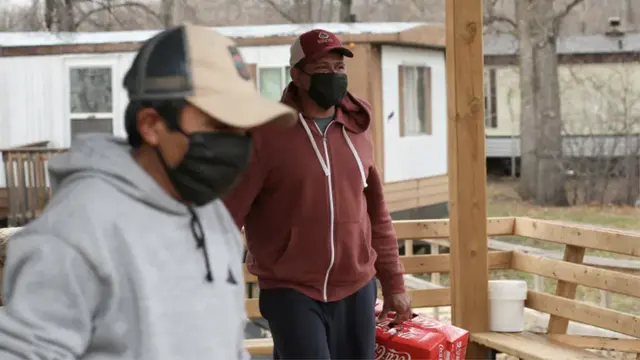
Workers from Mexico wear protective face masks during a 14-day quarantine after arriving at Mayfair Farms in Portage la Prairie, Manitoba, Canada on April 28, 2020. /Reuters
Mexico will resume sending temporary farmworkers to Canada after the two countries reached an agreement on improved safety protections for laborers on Canadian farms during the coronavirus pandemic, the Mexican government said on Sunday.
Mexico said last Tuesday it would pause sending workers to farms with coronavirus infections after at least two of its nationals died from COVID-19 after outbreaks on 17 Canadian farms.
Canadian farmers rely on 60,000 short-term foreign workers, predominantly from Latin America and the Caribbean, to plant and harvest crops.
Mexico's Foreign Ministry said in a statement that the Temporary Agricultural Workers Program (PTAT) had "entered into operation once again after a temporary pause."
The two nations "reached an agreement to improve the sanitary conditions of the nationals who work on farms," the statement added.
On Friday, Canada announced that its government is overhauling its temporary foreign worker program, after coronavirus outbreaks on Ontario farms sickened hundreds.
As part of the review, surprise inspections of working and living conditions on farms will immediately increase, Ashley Michnowski, communications director for Canada's employment minister, said.
At least 17 Ontario farms have seen outbreaks. Two Mexican workers died after contracting the virus.
Migrant workers cited a litany of concerns, including cramped, decrepit housing and being forced to work while awaiting COVID-19 test results, according to a report this month by Migrant Workers Alliance for Change.
"The piece that's missing is enforcement," said Santiago Escobar, national representative of Agriculture Workers Alliance, an association that represents non-unionized migrant workers.
Another factor contributing to the outbreaks may be a patchwork of housing standards. In Ontario, they vary by municipality, while other provinces set standards themselves, said Beth Connery, a Manitoba vegetable farmer and chair of the Canadian Horticultural Council's labor committee.
Some foreign workers do not report sickness because they may not get paid during self-isolation or because they don’t understand the health care they are entitled to, said Dr. Wajid Ahmed, Medical Officer of Health for Ontario's Windsor-Essex County Health Unit.
Others do not follow physical distancing because of crowded accommodations or when they meet workers from other farms, he said.
(With input from Reuters)
 简体中文
简体中文

